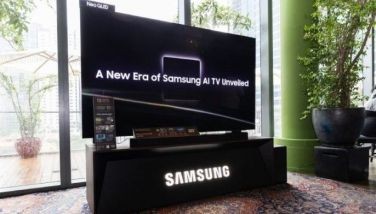Lucio Tan, a model in humility
"Even the accomplished suffers setbacks sometimes. The more bitter the lessons, the greater the successes will be."
– Lucio C. Tan
Even as a young man barely out of his teens, Lucio C. Tan already exhibited the traits that would someday make him one of the most successful businessmen in the Philippines. These were his sense of responsibility, perseverance, diligence, a quest for knowledge and the resolve to scale greater heights even amidst adversity.
At the age of 20, he began to go into business while trying to earn a bachelor’s degree in Chemical Engineering at the Far Eastern University (FEU). His first business venture – a corn starch factory – failed. But instead of being deterred, Tan persisted and worked even harder to succeed in business.
Tan started to make it big in 1960 when he founded Himmel Industries, a glycerine factory which was the first of its kind in the Philippines. According to the book published by Xinhua Publishing House, Tan discovered that the raw materials for glycerine, a lubricant used by local cigarette factories, which was being imported by the local manufacturers were available locally. As a result of Tan’s pioneering effort and perseverance, Himmel became the biggest supplier of glycerine in the country and the rest, as they say, is history.
Despite his flourishing businesses, Tan continues to find great pleasure in learning. Today, his eagerness to learn, his thirst for knowledge, remains as strong as ever, the book says.
"Forty years have passed since I left the Far Eastern University, but I never stopped trying to gain more knowledge. No matter how busy I am, I find time to read, day and night," the book quoted Tan as saying.
As a crowning glory for his insatiable desire for knowledge, the Central Luzon State University, a leading educational institution, conferred on him an honorary doctorate degree in applied agriculture on Nov. 29, 2000.
|
|
Lucio Tan is the eldest of seven children– five boys and two girls – who migrated in 1938 from Fujian province in China to settle in the Philippines. When his father fell ill and was bed-ridden, the responsibility of bringing up his siblings and taking care of the family fell on his shoulders. The book narrates that when Tan’s late father was critically ill, he had the ancestral family house in Quinyang town, Jinjian of Fujian province renovated to allow his father to spend his remaining days in the comfort of his own birthplace.
After his father passed away in 1993, Tan’s mother also fell ill. But despite Tan’s busy work schedule, he always took the time to be with his mother everytime he got the chance. According to the book, Tan would hold his mother’s hands and together they would recite Zhuge Liang’s famous work "Tribute to the King on Dispatching Troops," which she first taught him when he was young.
The book also relates that Tan regularly celebrates his mother’s birthday together with all the members of the family. On Feb. 27, 2001, when his mother turned 87, Tan personally directed the preparation of the birthday party, which was held at the Century Park Hotel. The grand occasion drew more than 1,000 guests.
With the taipan’s various businesses here and abroad growing by leaps and bounds, Tan enlisted the help of his brothers, giving them key positions in the conglomerate, including his brothers-in-law. Next to him, brother Eng Chan is president of Asia Brewery (China); second brother Mariano serves as his chief financial officer; third brother Harry heads the public relations department; and youngest brother Frank is stationed in Hong Kong.
Brothers-in-law Domingo Chua was given an important position here in the country while the other, Cheung Chi Ming is in charge of business in China.
|
|
Despite his immense wealth, Tan continues to live simply. In fact, his simple lifestyle has fascinated not just the people around him, but even foreign visitors who get to meet Tan in person. In fact, some of his foreign visitors, the book says, think him as "an extraordinary person."
Vastly different from the lifestyle of a billionaire most people have come to expect, Tan is not surrounded by expensive ornaments or high-tech gadgets in his office. It is also said that when Tan is late for his meals, his employees would bring him his favorite food– a slice of cake or ice cream made of taro.
According to the book, all that graces his office is a potted goematric landscape by the window, with water flowing around it. On the wooden shelves along the walls sit rows of samples of beer, rhum and cigarettes.
In the small meeting room for the Board of Directors, a long table is laden with all kinds of food–southern Fujian delicacies such as mung bean cakes, peanut shortbread and dried meat floss.
The book says that when he meets his guests, Tan gets right to the point without an exchange of conventional greetings.
|
|
With his continuing quest for knowledge, it was not surprising to learn of Tan’s continued support to the academe.
Tan, the book narrates, continues to sponsor charitable activities carried out by various sectors to foster education.
For example, in the 20 years that the Federation of Filipino-Chinese Chambers of Commerce and Industry has been implementing its Rural School Building Program, Tan actively participated in its projects. He is the principal sponsorof the "Voice of Our Youth," the first nationwide English impromptu competition in the country.
In 1984, Tan established the Foundation for Upgrading the Standard of Education (FUSE) and became its vice-chairman. He actively supports the foundation’s core plan of training teachers in an effort to raise the education level in the country and improve the teaching of English, science and mathematics. He even shouldered the expenses for training the teachers.
For a 1995 TV teaching demonstration project, the book says, Tan footed the bill for producing 30,000 sets of videocassette tapes demonstrating the teaching of science, chemistry, physics and English. The foundation distributed these to more than 1,500 primary schools nationwide.
In the early 80s, he began to participate in an international book donation program called "Books Across the Sea" by providing seed money to pay shipping, warehousing and delivery of books. By the first half of 2001, some nine million books have been collected from abroad and donated to more than 40,000 schools and libraries nationwide.
According to the book, Tan began to study Sun Zi’s famous "The Art of War" in 1969 under the tutelage of Chen Wei Shen, his former history teacher at Chiang Kai Shek High School. From 1971 to 1985, Tan business grew and prospered, but he did not stop reading books.
According to the book, he asked Prof. Chen to read and explain to him dozens of monumental classics, including the "History of Wars in China" which took him 15 long years to finish the book. From the 80's onwards, Tan regularly invites professors to teach him economics, principles from Lao Tze, "History of Wars in China," and "The Book of Changes."
His insatiable desire to gain m ore knowledge, has given Tan a broader visioin and more imagination to forge ahead courageously. "Perhaps this is where the secrets of his success lie," the book says.
- Latest
- Trending































